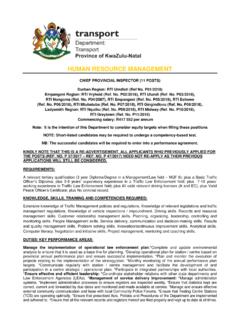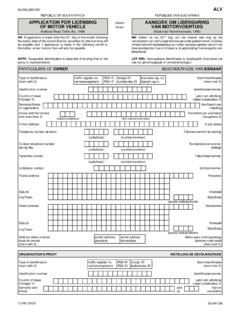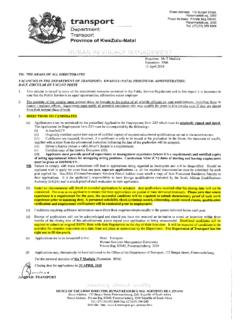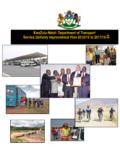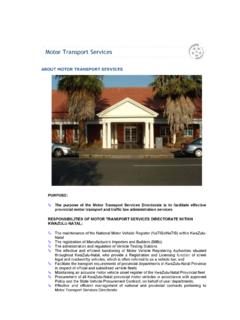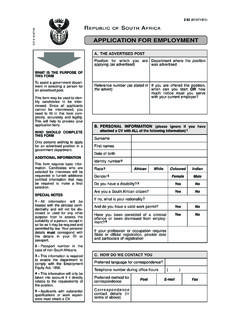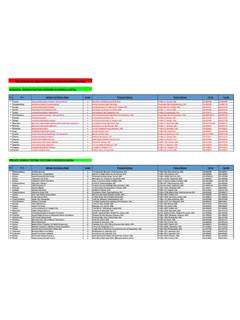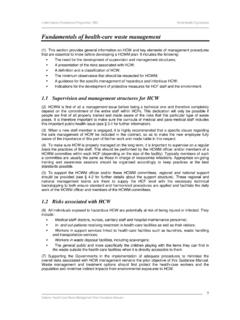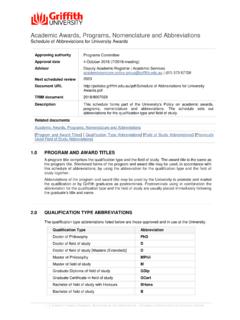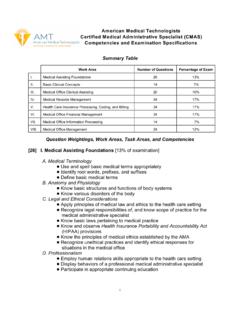Transcription of EXPANDED PUBLIC WORKS PROGRAMME - KwaZulu-Natal …
1 EXPANDED PUBLIC WORKS PROGRAMMEEXPANDED PUBLIC WORKS PROGRAMMECONTRIBUTING TO A NATION AT WORKKWAZULU NATAL Mr. Bheki CeleMEC For Transport, Community Safety & Liaison Mr Chris HlabisaHead of Transport Department of Transport Spearheading the EXPANDED PUBLIC WORKS PROGRAMME (EPWP) in KwaZulu-Natal Introduction 4 Institutional Arrangements 4 Social sector Early Childhood Development (ECD) - Jozini 5 Environmental Sector 7 Siyazenzela 7 Eco-Coffins 8 Economic Sector Nyamvubu Co-operative 10 Infrastructure Sector 11 Zibambele 11 Department of Transport Empowering Women 12 P577- ARRUP 14 Training Sector 15 Contact Details for Sector Champions 16 INTRODUCTION BACKGROUND EPWP was launched in KZN on the 28th August 2004 in the Ndwedwe village. The purpose of the launch was to raise awareness regarding the PROGRAMME in the Province and also to invite all stakeholders including State Owned Enterprises to take up challenge with regard to address the developmental challenges that are facing the Province of Kwa-Zulu Natal.
2 The Department of Transport in KZN was mandated by the KZN Cabinet to lead and spearhead the PROGRAMME in the ARRANGEMENTS AND SECTOR COORDINATION:There are two structures that oversee the coordination of activities and implementation of the EPWP in the Kwa-Zulu Natal Province, the EPWP Provincial Steering Committee and the Sector Coordination Committees. The EPWP Provincial Steering Committee is convened by the Department of Transport on a bi-monthly basis and the Sector Coordinating Committees are being convened on a monthly basis by sector lead Departments. Table 1 is the structure of coordination in the Kwa-Zulu Natal Province, and the five sectors of EPWP and their participating Sector Lead DepartmentParticipating Provincial Departments in the SectorInfrastructure DepartmentDepartment of Transport Department of WORKS Department of Local Government and Traditional Affairs (MPCC s and TAC s) of Housing Department of Transport Department of Education (Facilities) Department of Health (Facilities) Municipalities Eskom IthalaSocial sectorDepartment of Social Welfare and Population Development Department of Social Welfare and Population Development Department of Education (Early Childhood Development Department of Health (Home Community Based Care))
3 MunicipalitiesEnvironment and CultureDepartment of Agriculture and Environmental Affairs Department of Arts, Culture and Tourism Department of Agriculture and Environmental Affairs Department of Sports and Recreation MunicipalitiesEconomic SectorDepartment of Economic Development Department of Economic Development Ithala Trade and Investment KZN LED units of MunicipalitiesTraining SectorDepartment of Labor Economic sector Lead Dept. Social sector Lead Dept. Environmental sector Lead Dept. Infrastructure sector lead Dept. SETA sTable 1: Provincial Coordinator: Kwa-Zulu Natal Department of TransportSectorNumber of Jobs to be createdBudget 07/08 Project / ProgrammesInfrastructure80 000 work opportunitiesR1,6 billionMasakhe ECDP, Vukuzakhe, Zibambele road maintenance, Labor Intensive Construction, School Programmes, housing projects, African Rennaisance Road Upgrading PROGRAMME , Labour Based Construction PROGRAMME , water and sanitation.
4 National Youth ServiceSocial Sector9 300 WORKS opportunitiesR188 millionHome Community Based Care and Early Childhood Development ProgrammeEconomic Sector529 work opportunitiesR20 millionCo-operativesSMME DevelopmentVuk UphileEnvironment and Culture Sector 12 399 work opportunitiesR 347 million Small business fair, theatre skills development, music and film development, sustainable land based, land care, working for water, working for fire, eco coffin and Siyazenzela community based waste management Training SectorR19 million from Department of LabourTechnical Skills development PROGRAMME , leanerships and life skills trainingTable 3: Jobs To Be Created In The Year 2007/2008 KWAZULU-NATAL4th QUARTER 2004/054th QUARTER 2005/064th QUARTER 2006/07 Number of Projects1388471014 Budget (2005/06)295,445,511449,638,5841,781,930 ,590 Expenditure261,504,003346,477,2071,008,1 26,463 Person years of work including training 11,16514,06823,894 Gross number of job opportunities created41,31348,607117,965 Calculated net number of work opportunities created41,16246,993115,628 Person years in training001,144 Table 2: Year-on-year: KwaZulu-Natal (overall)-selected indicators: Jobs Created 2004/05 2005/06 and 2006/07 BACKGROUNDD epartment of Social Welfare and Population Development coordinates Social Sector in Kwa- Zulu Natal.
5 The sector focuses mainly on the Home Based Community Centers (HCBC) and Early Childhood Development (ECD). JOZINI PROJECTOne of the achievements by the Social sector is that a Memorandum of Understanding (MOU) is being signed between the Department of Welfare, Department of Health and UMsobomvu Youth Fund and Department of Labor in responding to the National Department of PUBLIC WORKS call on the implementation of National Youth Service. The three parties have made commitments in funding the PROGRAMME . Department of Health is responsible for stipends and 10,8 million for up, Department of Welfare has also contributes R10 million on the PROGRAMME and UMsobomvu will be responsible for Project Management at 5 million. 275 youth will benefit.
6 The Department of Education also provides training on Early Child Development practitioners and have learnership and skills PROGRAMME to be implemented in the third quarter of 2007 is one of the Early Childhood Development (ECD) flagship projects in Jozini area: The EXPANDED PUBLIC WORKS PROGRAMME (EPWP) in the Province is continuing to provide training to Early Childhood Development (ECD) practitioners with accredited training in the form of learnerships. Ninety nine (99) practitioners are currently participating in learnerships in Ngwavuma, Ubombo, Mahlabathini and Hlabisa. Some of the current learnerships are funded by the Department of Education and some of them by the ETDP SETA. ECD service and programmes are particularly important for children living in poverty and vulnerable children, as it can enhance their long-term capacity to participate fully in the realization of their rights and abilities.
7 The early childhood years are the critical year s period for the development of innate potential. Studies have shown that infants raised in stimulating environments have better brain function in later LEARNERSHIP IN UBOMBOType of training: NQF Level 4 - ECDD uration of training: 13 monthsTraining implementing body: Social Cluster with the ETDP SETANo of learners (practitioners): 28 Stipends received by learner: per learners who are participating in this learnership were drawn from the ECD sites that are subsidized by the Department of Social Welfare and Population Development and they have been working in ECD sites for EARLY CHILDHOOD DEVELOPMENT LEARNESHIPS - ECD PROGRAMME JOZINISOCIAL SECTORECD Practitioners in JOZINI more than 3 years without any training received in child care.
8 These learners are working in poor communities that are failing to provide them with decent wages for the hard work that they do, as a result grants that they receive from the Departmnet of Social Welfare differ from site to National Certificate in ECD at NQF L4 is being undertaken with the 28 learners who are all women. This qualification is made up of 120 credits consisting of fundamentals, core and electives. The fundamental is made up of Mathematical Literacy and Communication Studies and Language. Core is made up of Facilitate active learning (FAL), facilitate healthy development and Manage a learning PROGRAMME . Electives offered are Support children and adults living with HIV/Aids and Manage a small scale ECD staffs have visited the sites and it is sad to note the depth of poverty.
9 Many sites do not have the basic resources to work with. The skills taught in terms of making resources augers well in this is indeed positive to note the commitment and enthusiasm of the learners who put in many hours into contact training, completing assessment tasks at home under candlelight, lovingly providing a stimulating environment for children, including orphans. This we believe will provide the foundation for further Gumede a Practitioner describes the PROGRAMME as follows: I feel equipped because we relate the training to practice as in story rings, music, discussion rings and special activities This training is very important to poor communities, we need it for our children to have the best, I enjoy learning and now I feel proud to be educated since we have done well in this module.
10 Ms NP Fakude, the supervisor at the Sibonele cr che said she has observed that the practitioners working with her have gained more information on how to deal with young children and have learnt to be creative. We also thank the key role players such as the DoE, EPWP division, the ETDP SETA and the Dept. of Social Development for contributing to capacitating small NGO providers like New Beginnings to continue their development work . Our work is not just a job; it is our passion to help people develop. We love what we do and we attribute our success to the latter and our quest to be innovative said Ms participating in the PROGRAMME receive stipends of per month and it does make a difference in the lives of these practitioners. Working as happy practitioners touch the lives of the young children they are working with in a positive they began with this learnership, these practitioners had no form of training in child care.
